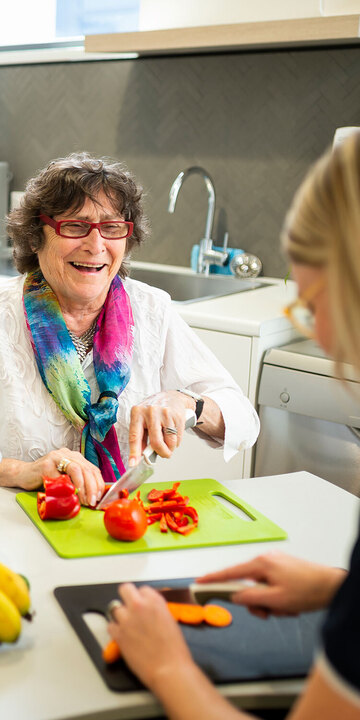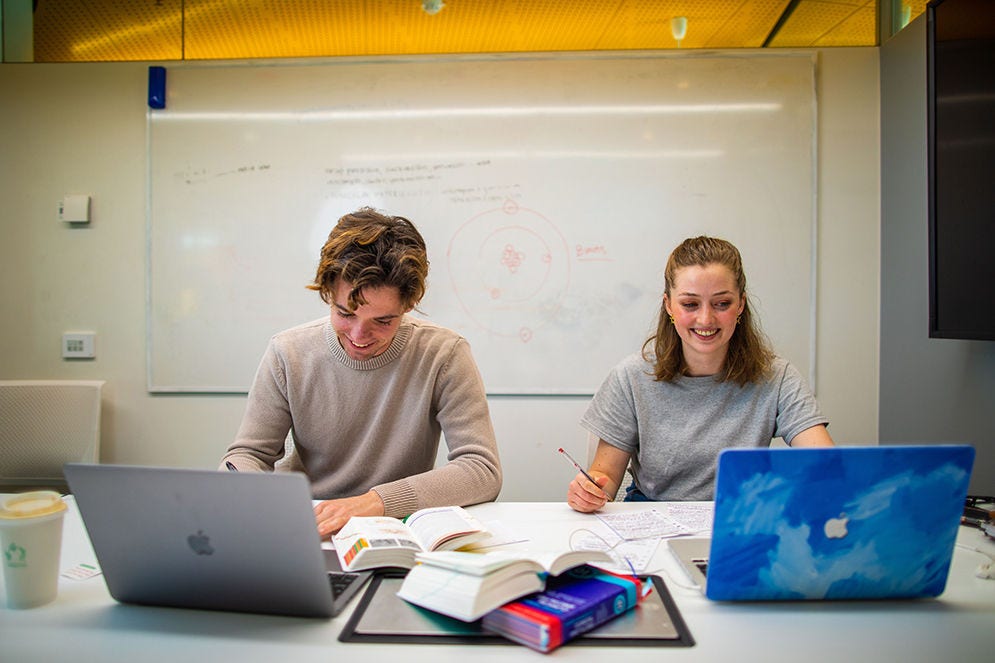Inherent requirements are the fundamental aspects of a program that must be satisfied by all students. They comprise the abilities, knowledge and skills required to complete the program.
There are five categories of inherent requirements for the Bachelor of Occupational Therapy (Honours) program, which include:
- Behavioural requirements
- Communication requirements
- Cognitive requirements
- Sensory requirements
- Motor requirements.
Behavioural requirements
During their studies (and professional careers), students will be exposed to a range of unexpected and emergency situations. Responding appropriately to these situations, and providing safe and effective care, will require personal resilience and a consistent, sustained level of physical and mental performance. Throughout the program, students will be required to practice and demonstrate skills on fellow students who are acting as simulated patients in mixed-gender practical classes. Students will also be required to act as a simulated patient. This may include some level of disrobing to expose body parts to simulate placement and practice experiences.
Students within the program will need to demonstrate the ability to:
- be receptive, and respond appropriately to constructive feedback
- effectively cope with their emotions and behaviour when dealing with individuals in the academic and practice setting
- provide a caring, therapeutic approach to the needs of all persons; mindful of culture, gender, sexuality or religion
- use self-awareness to monitor their own physical and mental health and wellbeing.
Communication requirements
Communication is a fundamental aspect of occupational therapy practice. Students must display the ability to communicate professionally, safely and in a way that displays respect for and empathy with others and develops trusting relationships.
Students within the program will need to demonstrate the ability to:
- use clear and precise English language speaking and listening skills
- document observations clearly and unambiguously
- understand and respond to verbal and non-verbal communication accurately with clients and colleagues from a wide range of cultural, religious and socio-economic backgrounds
- read and analyse complex health-related terms
- recognise and respond appropriately to cues in the practice environment
- communicate sensitively and respectfully with others from a range of culturally and linguistically diverse backgrounds
On completion of the program, students must also be aware of the registration requirements for English language competency in Australia as a registered occupational therapist with the Occupational Therapy Board of Australia .
Cognitive requirements
Students within the occupational therapy program must be able to think critically to analyse, synthesise and evaluate complex oral, written and visual information. These analyses are used to solve problems, provide evidence for clinical reasoning and enable the provision of timely, relevant interventions.
Students within the program will need to demonstrate:
- Numeracy and literacy skills
- high-level organisational skills
- a commitment to lifelong learning
- a willingness to critically appraise and reflect
- leadership abilities, including shared leadership
- the capacity to develop clinical reasoning and problem-solving skills
- the ability to apply and integrate knowledge of policies and procedures in a practice setting
- the ability to locate, summarise and review the quality of information from commonly available academic resources in a planned and timely manner
- proficiency in the use of current equipment and technologies that support learning
- the ability to retain information, processes and procedures to provide a range of occupational therapy interventions
- the ability to gather and interpret data (e.g. client notes, hand-written and computer documents, medical reports, statistics, community consultation and strategic plans, and policy documents).
Sensory requirements
Occupational therapy studies will demand the ability to recognise and respond appropriately to non-verbal cues. These observational skills (vision, hearing, smell and tactile) are required as part of all academic programs.
Students within the program will need to demonstrate:
- sufficient tactile function to undertake and perform a range of clinical skills and assessments
- the ability to observe the broader environment (e.g. observing multiple clients, environments and different components of the experience)
- precise and rapid reaction to sensory stimuli (e.g. identifying hazards and safety issues and reacting within a limited timeframe)
- the ability to recognise and interpret sensory stimuli relating to vision, hearing and touch.
Motor requirements
Studying occupational therapy requires an appropriate level of physical health. Students may be required to stand or sit on the floor for extended periods, and perform repetitive tasks that may require bending, squatting and kneeling, consistently and safely, without putting themselves or others at risk of harm.
Students within the program will need to demonstrate sufficient fine motor skills to:
- use hand-eye coordination to complete tasks as necessary
- gather and interpret information through touch
- perform and/or assist with diagnostic and therapeutic procedures
- operate health-related equipment and instruments
Students within the program will need to demonstrate sufficient gross motor skills to:
- undertake physical or manual tasks e.g. moving or positioning equipment and/or clients, percussion or palpation
- maintain physical safety with clients who experience unpredictable limb movements
- manoeuvre around equipment in confined spaces and over defined distances
- perform a range of occupational therapy interventions (requires the use of upper limbs and may require the assumption of a kneeling or sitting position for a prolonged period of time).









